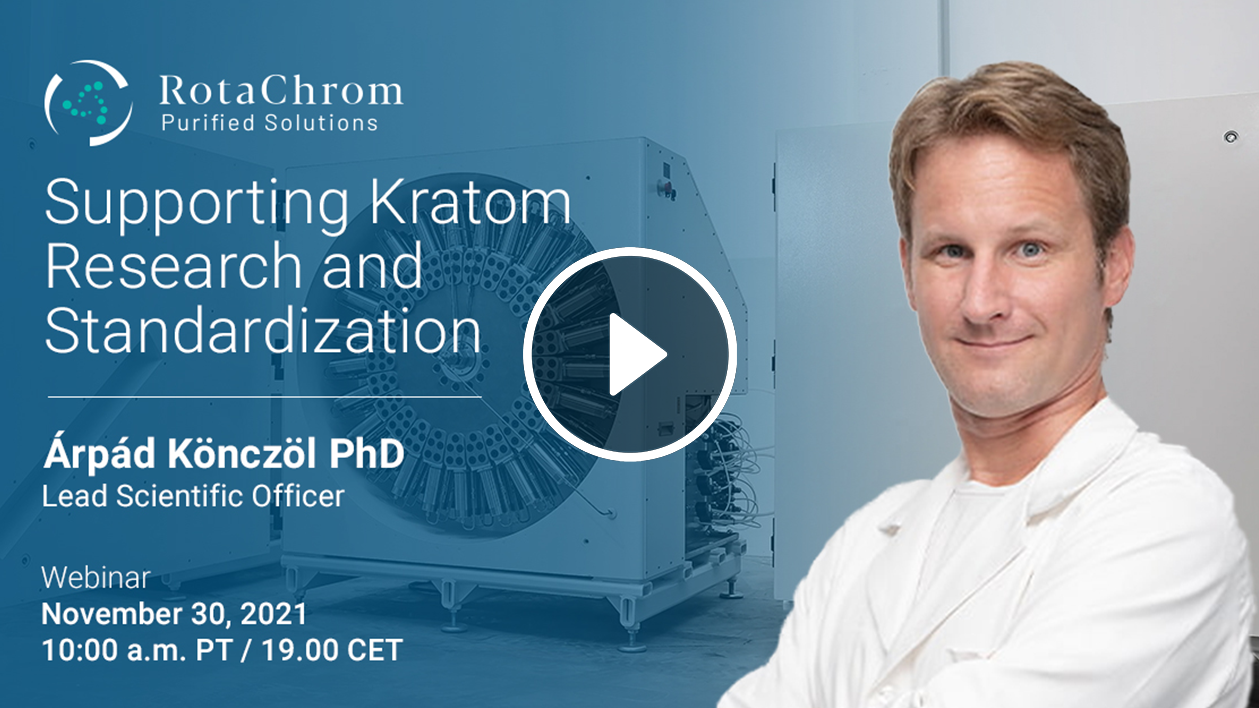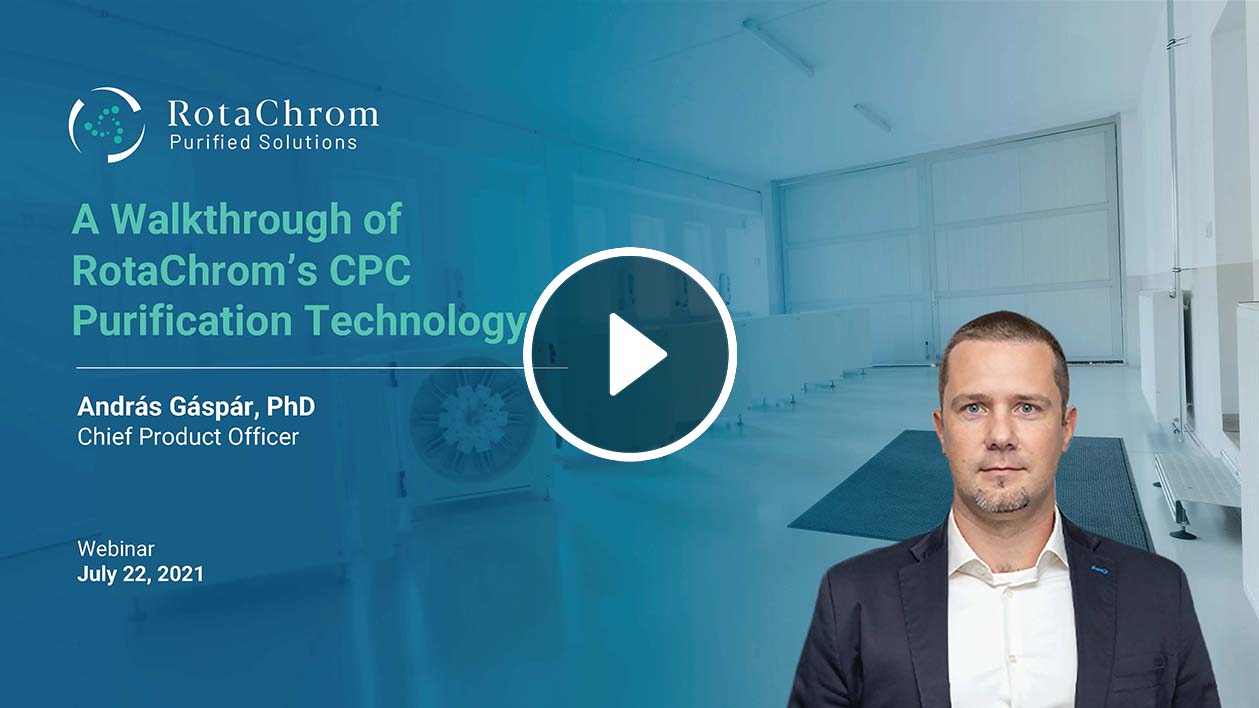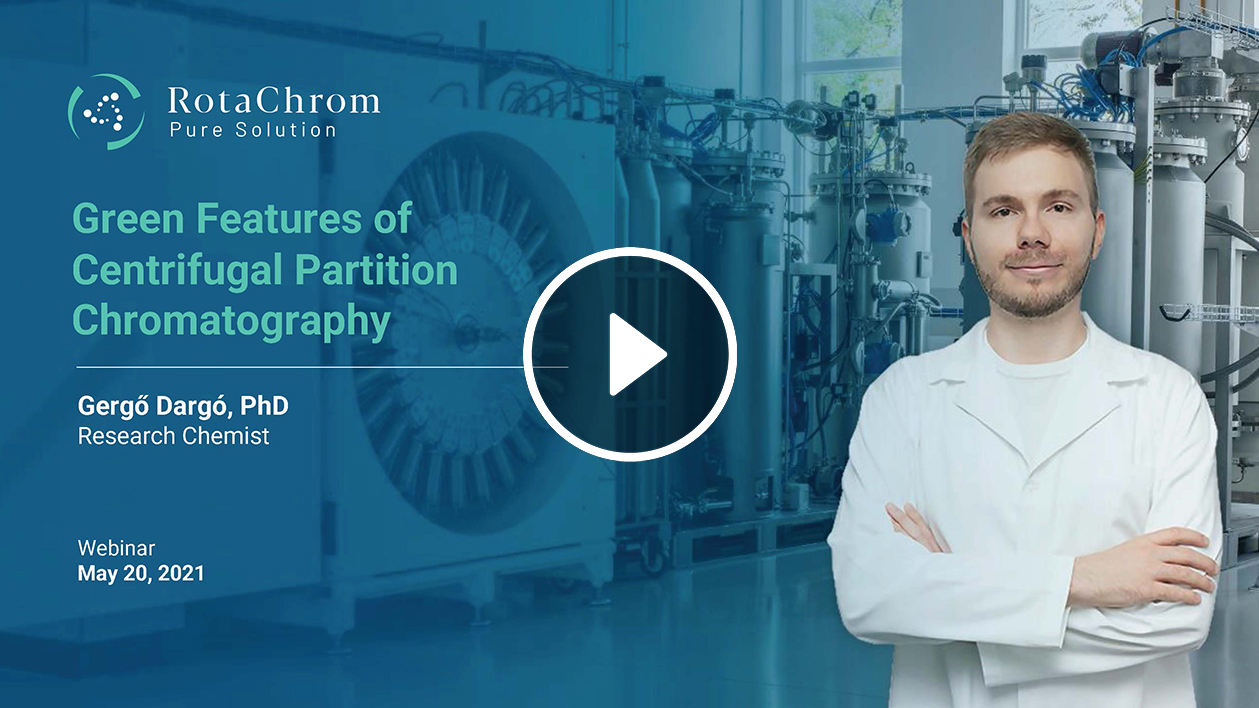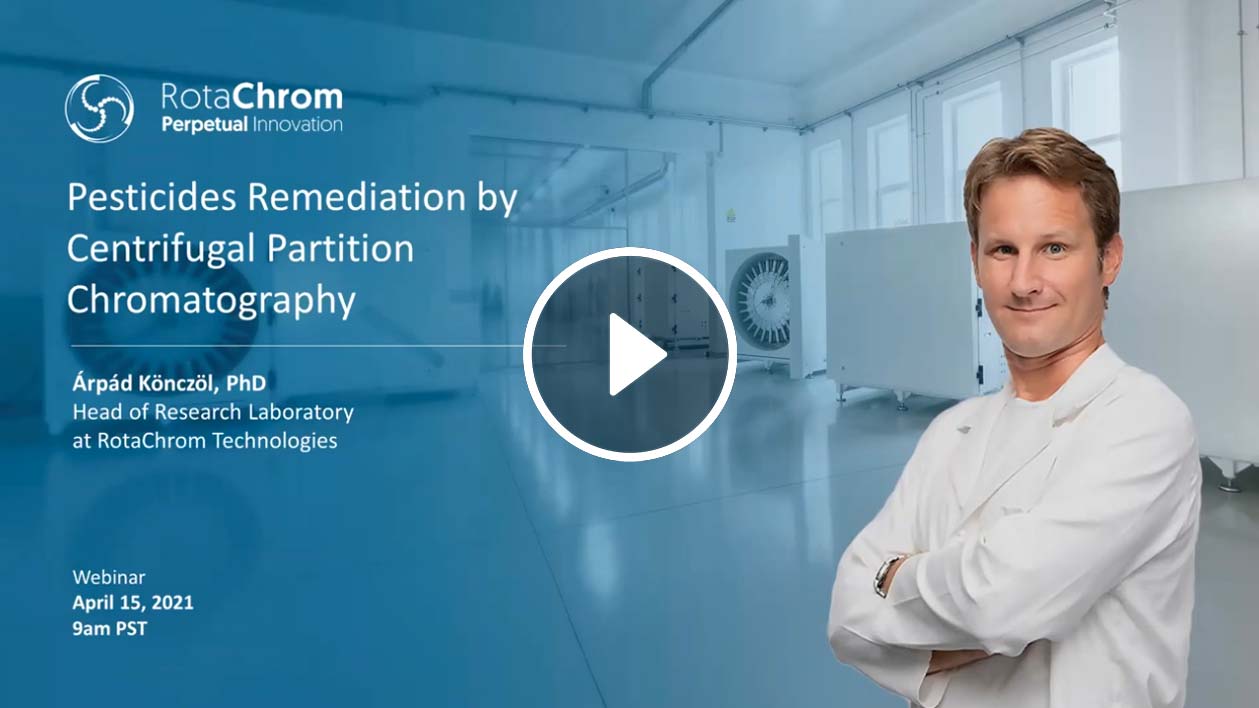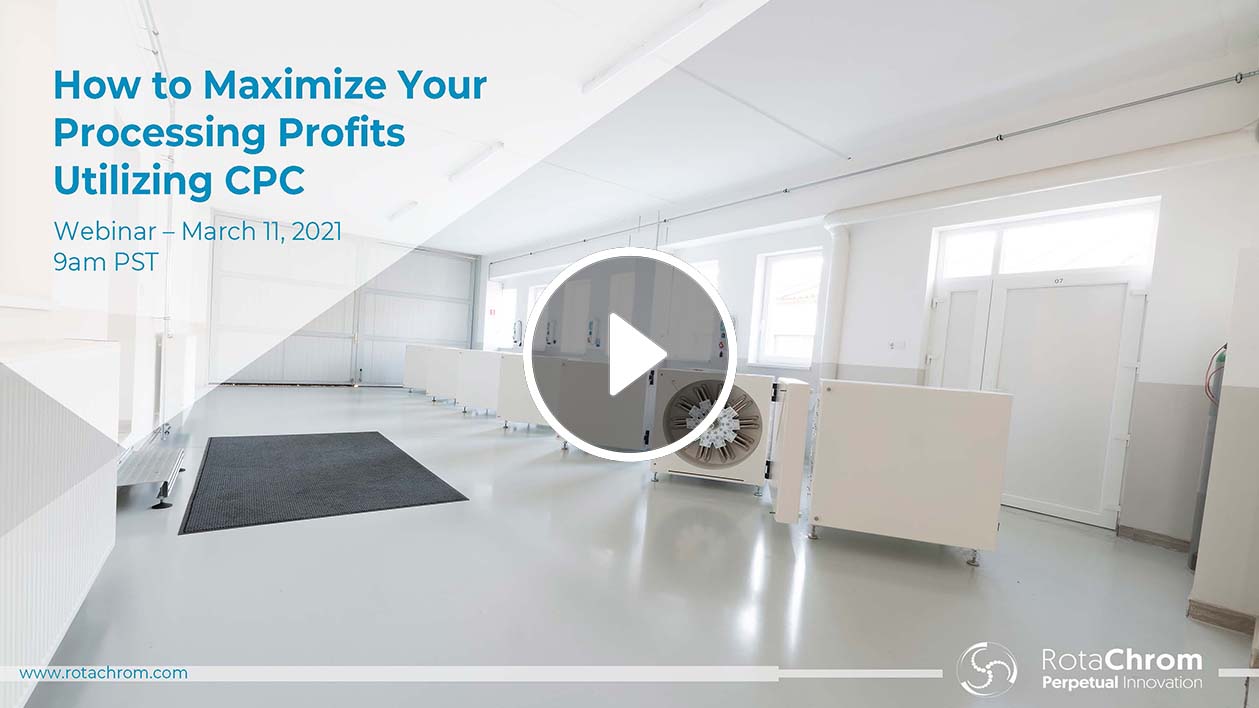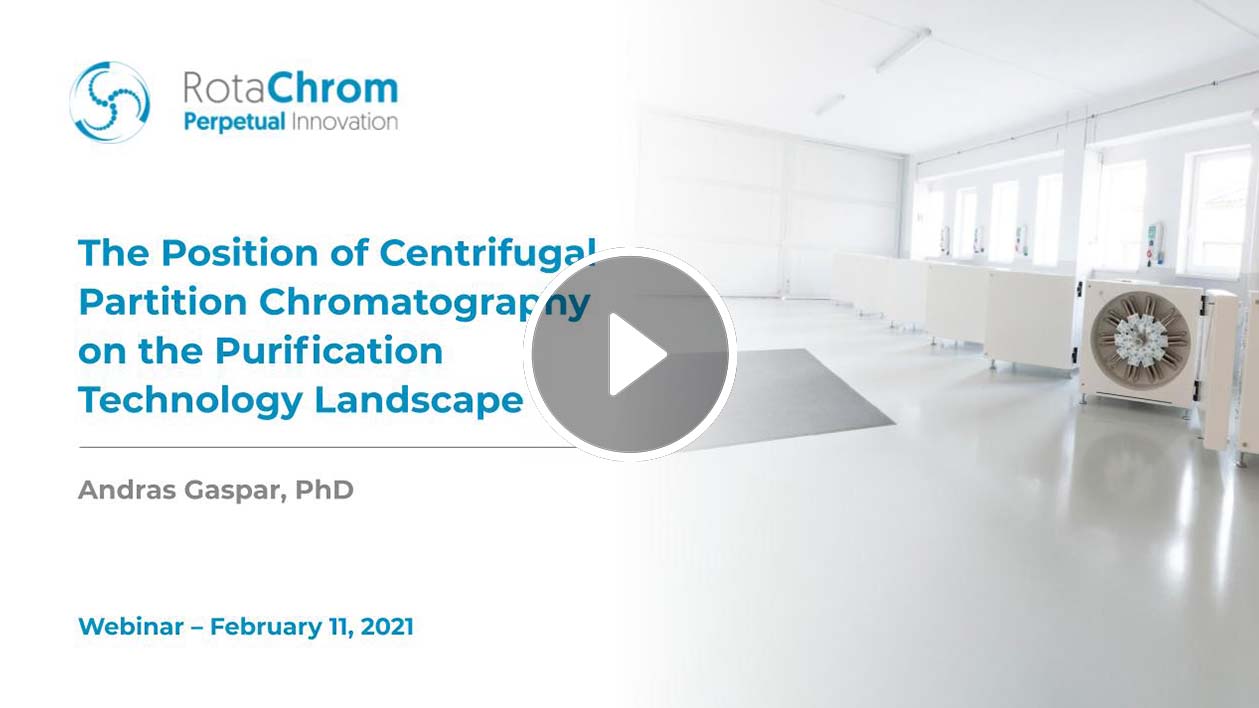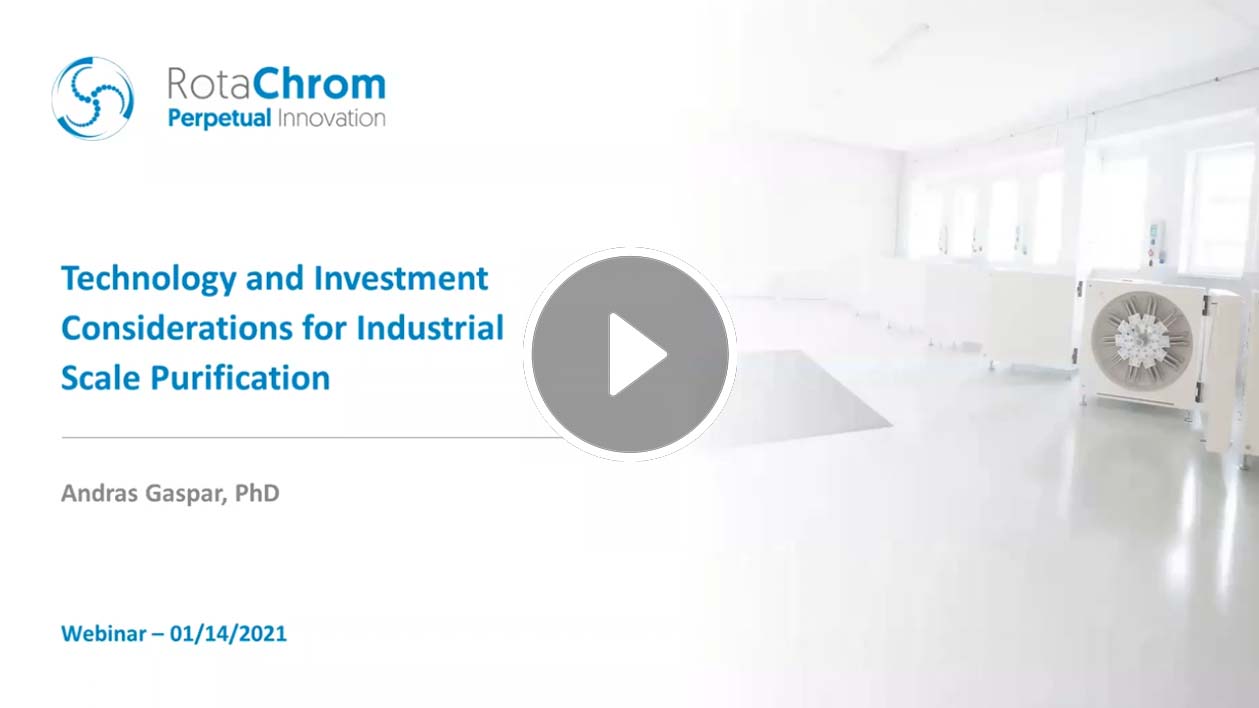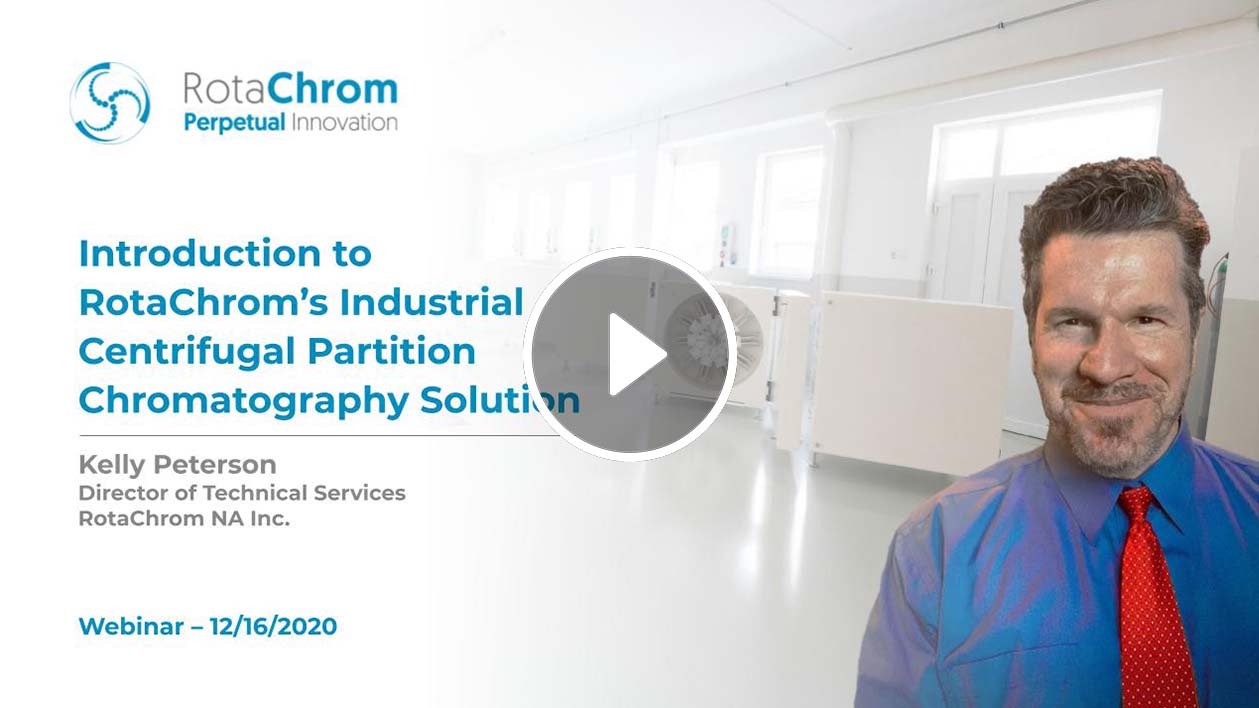Webinar 1 – Introduction to RotaChrom’s Centrifugal Partition Chromatography
In this webinar, Kelly Peterson, RotaChrom’s North American Vice President of Technical Services, gives a brief introduction to RotaChrom’s Centrifugal Partition Chromatography platform and discusses its key applications in the expanding cannabis industry.
RotaChrom is a technology company on the front lines of purification solutions for a myriad of industries. We manufacture world-class chromatography platforms widely used for botanical extract purification within the pharmaceutical, nutraceutical, and botanical industries. Notably, we have created the first industrial-scale Centrifugal Partition Chromatography (CPC) solution designed for large-scale applications. The platform allows companies to expand high purity production capacity with flexibility and scalability, while decreasing environmental impact.
This first webinar provides an overview of CPC, as well as a detailed look at RotaChrom’s CPC platforms, and the uses for the technology in the hemp and cannabis industries.
Part 1: Overview of CPC
Centrifugal Partition Chromatography, or CPC as it is commonly referred to, is a liquid-liquid separation technique. It is the next phase in chromatography, which has been around for many years. Scaling up with legacy chromatography can be difficult due to column packing challenges, reproducibility of the packaging process, and limitations of column dimensions. The column becomes so large that it is not feasible to run it for industrial-scale separation and purification.
In CPC, the chromatography “column” consists of cells interconnected by metal tubing arranged in a series on a rotor. CPC column capacity can be scaled by increasing the number and size of the cells. CPC offers high-precision as every run is performed with a refreshed stationary phase, adaptability as the solvent system can be easily switched, and it is cost effective as both stationary and mobile solvents can be reused extensively.
In CPC separation occurs between two immiscible liquid phases. The stationary phase is immobilized inside the rotor by a strong centrifugal force. The mobile phase, containing the sample to be purified, is fed under pressure into the rotor and pumped through the stationary phase in the form of tiny droplets, or percolation. This is a simple and reproducible mechanism that leverages different compound partition coefficients.
Let’s dive into the chemistry a bit. The CPC chromatogram demonstrates the separation of Compounds of Interest based on their unique partition coefficients achieved through a centrifugal partition chromatography system. The partition coefficient is the ratio of concentrations of a compound in a mixture of two immiscible solvents at equilibrium. This ratio is therefore a comparison of the solubilities of the solute in these two liquid phases.
Because of this chemistry, RotaChrom’s CPC has many operational advantages and environmental benefits. The core advantages of CPC include:
- Highly flexible due to the liquid-liquid separation (elution/extrusion, MDM).
- No irreversible absorption, no expensive and variable stationary phase, and nearly total sample recovery.
- High loadability with an outstanding stationary phase ratio.
- Easy scale up with mostly linear trends in operating parameters
- It is quite versatile and lends itself well to experimenting with the chemistry of the process. The system has an extremely broad polarity range.
- Solvents used in CPC can be recycled and reused, an important and sustainable effort.
- The liquid-liquid separation allows for consistent results.
Part 2: RotaChrom’s CPC Platforms
RoaChrom offers easy scale up for businesses needing purification with two types of CPC at different sizes.
The smallest scale platform is the rCPC in which the “R” stands for research. This pilot scale instrument is designed to demonstrate proof of concept, perform small scale production, and to develop and optimize biphasic solvent systems, for specific purification projects. The rCPC platform is capable of processing between 100 to 300 grams of input material per hour. Loading capacity is dependent upon the compounds of interest and corresponding method. There is a balance sought between purity, throughput and yield.
RotaChrom’s industrial-scale system is called the iCPC and is a fully integrated, industrial-scale purification system. It is optimized for solvent handling including preparation, recycling, and reuse. With continuous batch production, it is a sustainable and economical solution
The pCPC system is comprised of industrial scale, auxiliary SKIDs, and an iCPC. The “P” stands for Production and it is a PLC-controlled (Programmable Logic Controller), fully-automated platform capable of industrial scale solvent preparation, solvent recycling and recirculation. The instrument is designed for continuous batch processing and to maximize efficiency and production capacity. The pCPC is capable of processing anywhere between 1 to 3 kg/hour depending on the crude input material and purification project goals.
The pCPC system consists of six major components, including five auxiliary skids and the PLC.
- The mixer-settler skid is designed for solvent preparation and maintains the desired solvent ratio for the method in use. The goal with the mixer/settler is to manage solvent ratios for optimal separation of the compounds of interest.
- The input buffer SKID stores the mixed solvents in two large tanks, and includes the sample introduction tank. These tanks feed the industrial (i)CPC, where compounds are separated.
- The fraction collector stores up to nine, isolated fractions captured from the iCPC separation in automated fashion.
- The output / Impurity (Waste) SKID – The function of the Impurity SKID is to store the flow streams from the iCPC (both upper and lower phases) that do not contain a significant amount of COI. This is in preparation for recycling used solvents back into the pCPC process.
- Evaporator SKID The function of the Evaporator SKID is to recycle the solvents mixtures stored in the Impurity or COI SKIDs.
- PLC – Programmable Logic Controllers that retain operational firmware, programmable parameters, sensors and detectors, and a touchscreen user interface.
Solutions for Hemp Industry
RotaChrom’s technology can purify large, industrial-scale batches of hemp-derived products with near continuous, automated operation. Some examples include CBD isolation, THC remediation, CBD minor remediation, and pesticide remediation.
We understand the investment in hemp separation and purification technology. RotaChrom works closely with customers through all phases of planning and acquisition, implementation, ongoing operation and maintenance, training and method development. Our scope expands beyond the CPC equipment to your success!
About Kelly Peterson: Kelly Peterson to Vice President of Technical Services at RotaChrom North America. Formerly the Director of Technical Services at RotaChrom, Peterson previously spent eight years as a Senior Field Service Engineer at SCIEX and also worked as a Groundwater Chemist for the Colorado Department of Agriculture. Peterson studied chemistry at the University of Colorado Denver and also completed research while working for the CU-Denver Department of Chemistry.
WATCH ALL WEBINARS

11-30-21
Supporting Kratom Research and Standardization
7-22-21
A Walkthrough of RotaChrom's CPC Purification Technology
4-15-21
Pesticides Remediation by Centrifugal Partition Chromatography
3-11-21
How to Maximize Your Processing Profits Utilizing CPC
2-11-21
The Position of Centrifugal Partition Chromatography on the Purification Technology Landscape
1-14-21
Technology and Investment Considerations for Industrial Scale Purification
12-16-21
Centrifugal Partition Chromatography on an Industrial Scale
QUESTIONS? GET IN TOUCH!


